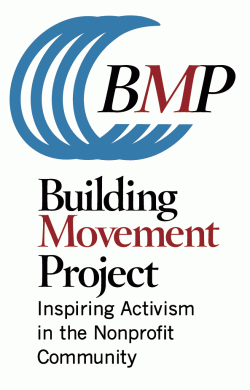May
9
2013

Written by Sean Thomas-Breitfeld
By Sean Thomas-Breitfeld, Co-Director
Last month, the Building Movement staff and project team discussed two articles on the connections between neoliberalism, marketization and the current realities of the nonprofit sector. Both articles reflected many of the frustrations expressed by colleagues and organizations on the ground about how budget cuts, competition for funding, and the focus on metrics can get in the way of helping people. While we haven’t explicitly thought about our work in terms of neoliberalism and marketization, the articles did connect to (and inform) our focus on nonprofits, social change goals and principles, and inspiring activism in the sector.
According to the article by Hasenfeld and Garrow, “neoliberalism recasts the role of the welfare state by shifting responsibility from state to market and from the collective to the individual.” This quote put many of today’s political problems in a broader, historical context. So when legislators decided last week to fix the long lines at airports caused by the automatic budget cuts but leave poor seniors without home-delivered meals, one can’t help but see it as an example neoliberalism at work.
In the midst of a values system that protects the market but leaves the vulnerable to fend for themselves, the notion from the article by Eikenberry and Kluver of nonprofits as “value guardians” connected for us. Guided by values of the common good, nonprofit organizations are the first line of defense in addressing economic problems and bringing attention to social needs; given these values, Eikenberry and Kluver write that:
“A corporate model, which stresses the values of strategy development, risk taking, and competitive positioning is incompatible with the nonprofit model, which stresses the values of community participation, due process, and stewardship.”
That assertion of fundamental incompatibility between corporate and nonprofit models is provocative, especially at a time when nonprofits are consistently told that innovations from the for-profit sector are not just transferrable and beneficial to our organizations, but are the models that matter most. But it also struck a few members of our team as false dichotomy.
One team member, Dushaw Hockett, pushed us to consider the market’s positive appeal, given that many people in our communities want to engage in the for-profit sector as customers and entrepreneurs. Another team member, Kim Klein, reflected that owning her own consulting business has provided her with both flexibility and fulfillment. While the team could acknowledge the ways that we are sometimes willing participants in marketization (and even neoliberalism, to some extent), there was still a lot of concern about imbalance of power that the corporate sector has over our government and our nonprofit sector.
The role of government is one key to re-balancing the sectors. Neoliberalism and devolution have dramatically shrunk the role and power of government; and people disadvantaged by economic, racial and other oppressions have suffered terribly. Nonprofits also have a key role in creating balance between the three sectors. As the sector with a tradition of advocating for social rights, protecting common values, and considering both what’s legal and what’s right, the collaboration and blurring of lines between the sectors could be a positive thing if our best attributes – our concern for the disenfranchised and our protecting of the common good – rub off on the corporations and government.
